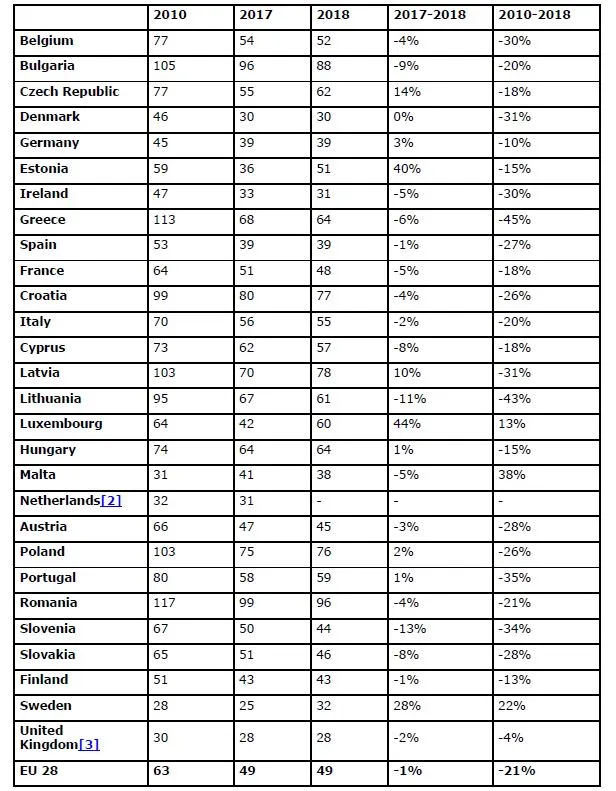The European Commissioner of Transport, Violeta Bulc, has announced EU road safety statistics for 2014 that give some cause for concern. In 2014 there were a total of 25,700 road deaths across all 28 Member States of the EU. Road fatality figures differ widely among Member States. The figures indicate only a 1% improvement since last year, meaning that significantly more effort will be needed from Member State governments in order to reach the Commission's goal to halve the number of road deaths between 201
March 24, 2015
Read time: 3 mins
RSSThe European Commissioner of Transport, Violeta Bulc, has announced 3287 EU road safety statistics for 2014 that give some cause for concern. In 2014 there were a total of 25,700 road deaths across all 28 Member States of the EU. Road fatality figures differ widely among Member States. The figures indicate only a 1% improvement since last year, meaning that significantly more effort will be needed from Member State governments in order to reach the Commission's goal to halve the number of road deaths between 2010 and 2020.
Jacob Bangsgaard,8055 FIA Region I Director General said, "Europe has come a long way to improve its road safety record. If we are to remain a world leader in this area, further efforts are clearly needed. Achieving the 2465 European Commission's target of halving the number of road deaths by 2020 requires programmes for better driver education, ensuring that vehicles are safe and that the road infrastructure is secure. It means putting 5-star drivers in 5-star vehicles on 5-star roads. I hope that these results will serve as a wakeup call and remind national governments to put the necessary time and investment into saving the lives of road users."
Meanwhile Antonio Avenoso, Executive Director of the1197 European Transport Safety Council (ETSC) commented, “While there is no single factor that explains today's deeply worrying figures there is no doubt that in recent years, the EU and many member states have shifted road safety way down the priority list. If you cut back on police enforcement and road maintenance, if you don't do enough to protect the increasing numbers of people walking and cycling, and if you ignore new trends such as distraction - it's obvious that the numbers dying will not just stagnate, they will start to increase.”
"We need to see short and medium term action from national governments and from the EU, starting today. Member states can boost police enforcement and that will have an immediate effect. The EU can start by extending its infrastructure safety rules that require regular audits and action on high risk sites. Currently these rules only apply to major EU motorways - but they should be extended to the entire road network."
"Looking ahead, this year the EU is working on the next generation of vehicle safety standards. We need to ensure that the technology with the most life saving potential is fitted to all vehicles as standard and not just the premium end of the market. Technologies such as Automated Emergency Braking and Intelligent Speed Assistance and getting seat belt reminders on all seats could revolutionise vehicle safety. Europe must lead that revolution, not rest on the laurels of past achievements."
Prior to this announcement, figures had been cited by FIA Region I Clubs in the UK and France indicating national increases in road deaths, hinting at today's announcement. FIA Region I urges national governments across the EU to prioritise road safety and to use these figures as a signal that EU needs to renew its efforts. Following these results, the upcoming revisions of the General Safety of Motor Vehicles Regulation should be used as an opportunity to introduce strict vehicle safety requirements and state-of-the-art in-vehicle safety technologies. The revision of the Directives on infrastructure and tunnel safety should also bring concrete measures to improve the quality of the road network.
Jacob Bangsgaard,
Meanwhile Antonio Avenoso, Executive Director of the
"We need to see short and medium term action from national governments and from the EU, starting today. Member states can boost police enforcement and that will have an immediate effect. The EU can start by extending its infrastructure safety rules that require regular audits and action on high risk sites. Currently these rules only apply to major EU motorways - but they should be extended to the entire road network."
"Looking ahead, this year the EU is working on the next generation of vehicle safety standards. We need to ensure that the technology with the most life saving potential is fitted to all vehicles as standard and not just the premium end of the market. Technologies such as Automated Emergency Braking and Intelligent Speed Assistance and getting seat belt reminders on all seats could revolutionise vehicle safety. Europe must lead that revolution, not rest on the laurels of past achievements."
Prior to this announcement, figures had been cited by FIA Region I Clubs in the UK and France indicating national increases in road deaths, hinting at today's announcement. FIA Region I urges national governments across the EU to prioritise road safety and to use these figures as a signal that EU needs to renew its efforts. Following these results, the upcoming revisions of the General Safety of Motor Vehicles Regulation should be used as an opportunity to introduce strict vehicle safety requirements and state-of-the-art in-vehicle safety technologies. The revision of the Directives on infrastructure and tunnel safety should also bring concrete measures to improve the quality of the road network.






